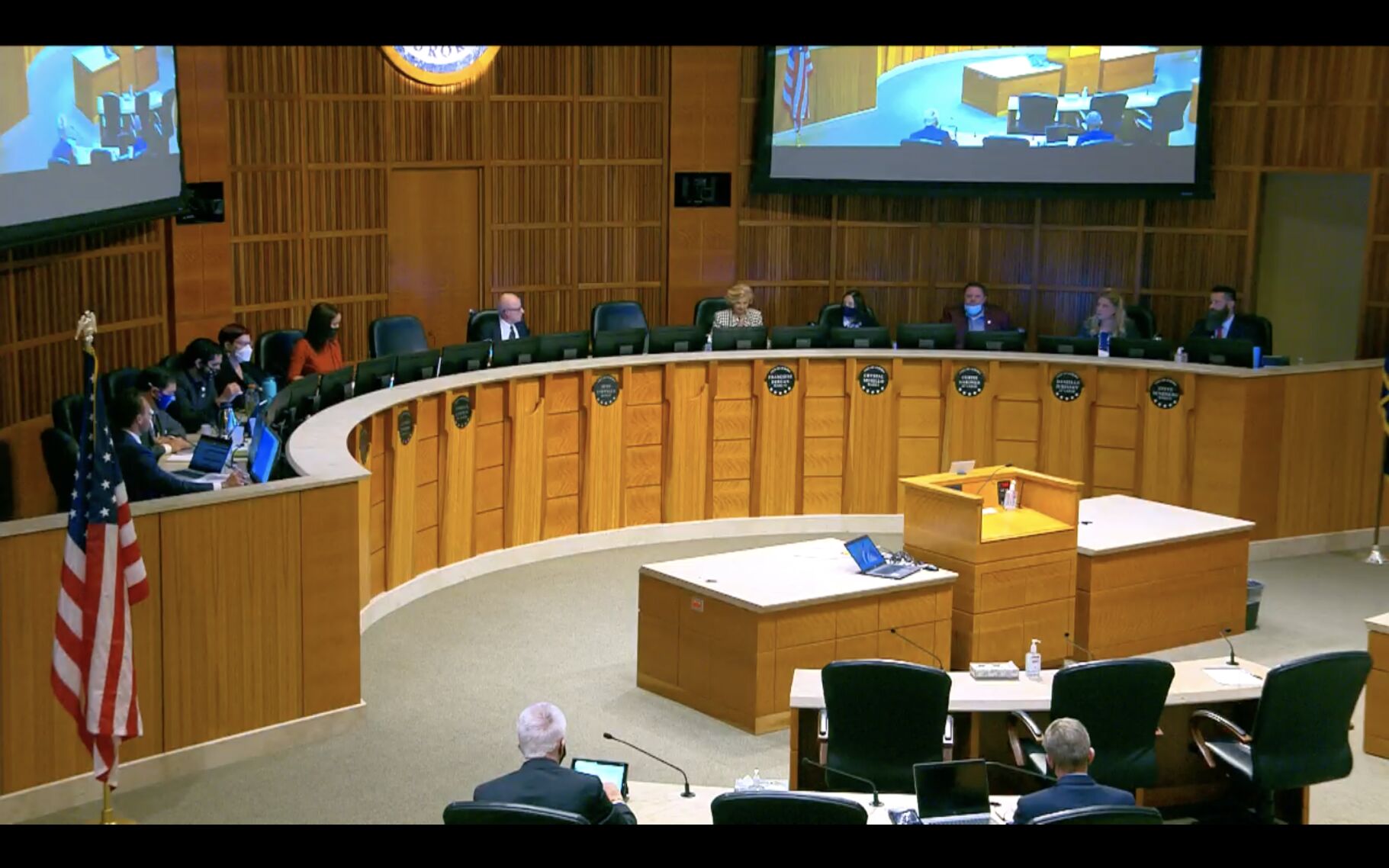Split Aurora city council approves retail theft jail sentences

A plan to require minimum jail sentences of three days for people convicted of stealing $300 or more worth of retail goods continued to divide Aurora’s City Council on Monday but still secured final approval. The policy takes effect in roughly 30 days.
Council gave early approval to the bill Sept. 12. The bill sponsor, Councilmember Danielle Jurinsky, said the city needs to focus on victims of retail theft and pursue stricter penalties to deter crime.
“And stop doing everything in our power to help the criminals,” she said.
Councilmembers Alison Coombs, Juan Marcano. Ruben Medina and Crystal Murillo voted against the ordinance, after a lengthy exchange between Marcano and Jurinsky debating the true costs of the proposal and its effectiveness at driving down retail crime.
Councilmember Alison Coombs said councilmembers concerned with murkiness around costs tried to find more information after the bill’s first reading, reaching out to the police department, attorneys and courts. A debate about needing a fiscal note preceded the council’s first approval of Jurinsky’s proposal, and echoed similar debates that unfolded as the city approved harsher penalties for auto thefts in July.
The councilmembers sought a clearer picture of how many cases the city could be handling on a regular basis, Coombs said.
Chief Cassidee Carlson presented data compiled by Aurora Police Department crime analysts regarding how many arrests and summons for retail thefts of $300 or more the department has counted since 2019.
For adult suspects, the number of physical arrests in 2019 was 59. That “dropped immensely” in 2020 to 12, Carlson said, and came in at 3 in 2021. The number to date in 2022 is 11. The department issued 118 summons in 2019, another 86 in 2020, then 60 in 2021. So far this year, the department has issued 27 summons to adult suspects in cases for retail thefts of $300 in goods or more.
The department arrested two juveniles in 2019 and none in the last three years. Police issued 41 summons to juvenile suspects in 2019, and 16 in 2020. Last year the department counted four summons issued to juvenile suspects and one so far this year.
Carlson said she did not have the department’s arrest rate available that night, but could follow up with that information, when asked by Marcano.
Councilmembers Dustin Zvonek, Steve Sundberg and Mayor Pro Tem Francoise Bergan all voiced support for minimum three-day jail sentences. Zvonek said retail theft “is a significant issue” in the city and undercounted. He also worried about the economic impact of retailers choosing to leave Aurora or choosing against locating in the city if it does not curb retail theft.
Mayor Mike Coffman said he has spoken with loss prevention managers at Walmart who indicated “these thieves are becoming more aggressive.” Coffman said he believes people committing theft “know the fact, that it is such a permissive environment.”
Coombs pressed Coffman on what he meant by “a permissive environment” and asked whether judges were using all the tools available to them, such as handing out fines that could be up to $2,650. That could also serve as a deterrent, she said.
Councilmember Marcano implored Jurinsky to consider alternatives to jail time. He has been a vocal critic of the proposal and steadfastly believes jail time will not be a successful deterrent. Marcano said research shows people’s belief’s that they will be caught is the true deterrent, not the penalty. Accountability should be focused on making sure people don’t recidivate, he said.
The city has already put $2.5 million in grant dollars to help businesses install security cameras and other environmental designs aimed at crime prevention, he said, and he prefers approaches such as diversion programs.
“A lot of the times when people go to jail, they just become better criminals,” he said.
Their life circumstances do not improve at home, and they might make poor connections while serving their sentence, he said.
Jurinsky reiterated she thinks jail time will work at preventing thefts and that she does not believe the plan will be a cost burden to the city.
The cost of housing someone in the municipal jail is $75 a night, she said. Jurinsky said the public defender’s office did not know what the financial impact might be and that there would not be a judicial fiscal impact, although Marcano and Coombs were skeptical.
Alternatives might be more financially burdensome to a person convicted of theft than jail, she said, citing fees associated with using an ankle monitor program. In total fees for hooking up and operating an ankle monitor could reach close to $300.
“That puts somebody further into poverty,” she said.
A judge could also order someone convicted of theft to attend classes such as a petty theft class, which come with another feed, on top of any restitution and fees people are ordered to pay, Jurinsky said.
Coombs agreed that the cost of diversion programs is a problem but said it’s not comparable to the financial fallout someone could face if they receive jail time and lose their job as a result.
Jurinsky had stood firm, and said she is willing to continue talks with Marcano about the issue in the future.
“You and I can look at the data together in a year and see if it’s not working,” Jurinsky said.














